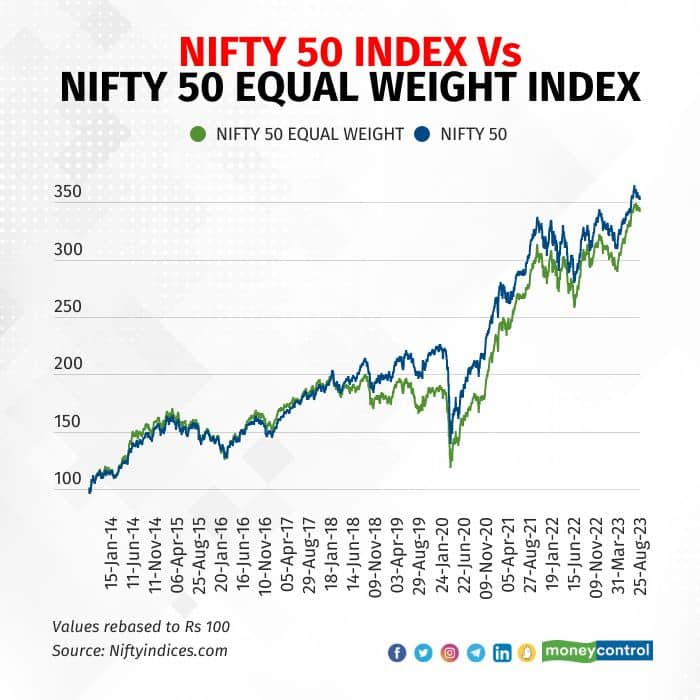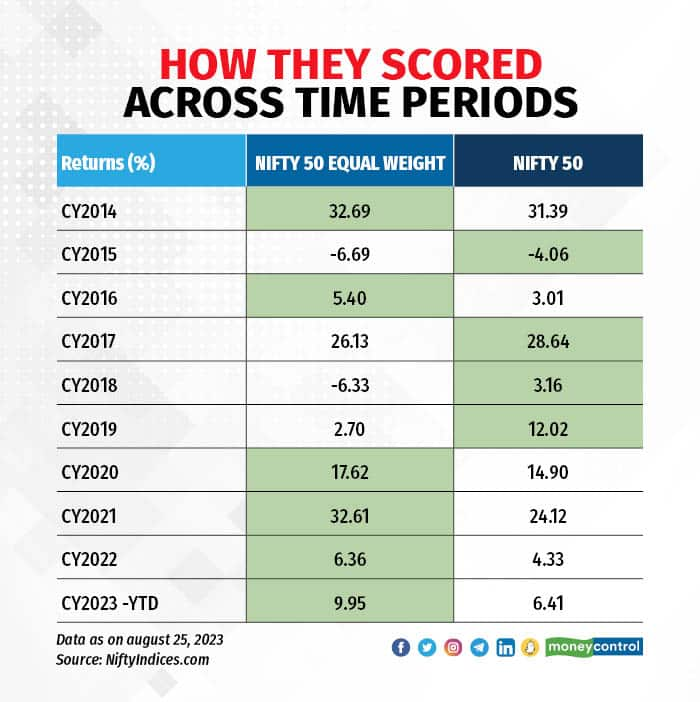



As actively managed large cap equity schemes find it difficult to beat large cap benchmarks, many investors look to invest in low-cost index funds mimicking underlying large cap indices such as Nifty 50, Nifty Next 50 and Nifty 100. However, the smarter lot of investors look for relatively low-cost alternatives that may offer a tad more than the benchmarks. Among various smart beta funds that contend for this investment opportunity, the equal-weight strategy appeals to many investors given its simplicity and portfolios comprising familiar stocks that are already present in popular indices.
What is on offer?Typically, the weights of each constituent stock in an index are determined by the free-float market capitalisation of the stock. For example, the stock of HDFC Bank has the largest 13.78 percent weight in Nifty 50 Index. The trouble is visible as we move down the list of constituents. The aggregate weight of the bottom 21 companies (13.55 percent) in Nifty 50 is less than the allocation to the largest company today. Put simply, the concentration of a few stocks puts the diversification on a back seat.
ALSO READ: Nifty Next 50 or Nifty Midcap 150: Which is a better bet?But equal weight investment portfolios call for allocating an equal amount of money to all stocks present in an index. In the Nifty 50 equal-weight strategy all 50 stocks present in Nifty 50 will get equal allocation – 2 percent each. The weights are rebalanced to 2 percent for each stock on a quarterly basis. This also means that sectoral representation in the underlying index may also change. For example, the financial services sector got 37.68 percent in Nifty 50 Index. But Nifty 50 Equal Weight Index had only 19.82 percent allocation to financial services, as on July 31, 2023.
In the case of Nifty 100 Equal Weight Index- all 100 constituent stocks are bought with a one percent allocation each. So the financial services sector gets 19.81 percent in Nifty 100 Equal Weight Index even as the plain-vanilla Nifty 100 Index allocates 35.05 percent to it.
What’s so special about an ‘equal weight’ index?Most stock indices are based on the free-float market capitalisation. This ensures that the stocks that are doing well keep getting more weight. But it also means concentration risk in some situations. For example, if the largest sector (‘Financials’ as of today) in the Nifty 50 Index starts giving sub-optimal returns, then the index performance also gets impacted. An equal-weight strategy with a quarterly rebalancing ensures that each stock is well represented – the investors get a truly diversified portfolio.
ALSO READ: Has FundsIndia’s pivot brought mutual fund distributors back into the limelight?Anil Ghelani, head- passive investments and products, DSP Mutual Fund says, “Nifty equal-weight strategy helps to buy good companies that have been leaders in their sector and have seen multiple business cycles, and to ensure good diversification across stocks and sectors.”
Sharwan Kumar Goyal, fund manager and head – passive, arbitrage and quant strategies, UTI AMC says, “Nifty 50 Index comprises 50 largest and most liquid companies which are also traded in derivative markets. An equal-weight strategy on Nifty 50 Index constituents offers adequate diversification to the investor.”
Has it worked?The oldest scheme offering equal weight strategy– DSP Nifty 50 Equal Weight Index Fund has given 24.46 percent returns over three years ended August 25, 2023, compared to 19.48 percent returns given by large cap funds as a category, as per Value Research. It trailed the performance of only two large cap equity funds – Bharat 22 ETF and Nippon India Large Cap Fund.

Over the last 10 years ended August 25, 2023, Nifty 50 Equal Weight Index and Nifty 50 Index have given 13.09 percent and 13.41 percent, respectively.
“Quarterly rebalancing of Nifty 50 Equal Weight Index ensures auto profit booking and auto averaging. Over the last 24 years, the Nifty 50 equal-weight strategy has delivered 2.1 percent excess returns on an annualised basis over Nifty 50 Index,” says Goyal.
ALSO READ: 10 most popular large-cap stocks among PMS to withstand volatilityBut there are periods when their performance varies by a wide margin.It has been observed that when the stock markets are consolidating, investors prefer to stay with a handful of large companies with a view to protecting the downside. In such scenarios, the Nifty 50 Index has done well. For example, CY2017-2019 was a period when Nifty 50 Index outperformed its equal-weight counterpart. However, post the Covid-19 shock, when the markets saw a large dose of liquidity and the economy came out of recession fears, the markets saw a broad-based rally. Over the last three years, Nifty 50 Equal Weight Index has outperformed Nifty 50 Index.

“Whenever there is a broad-based rally, depolarised market and when there are active sector rotations in those scenarios Nifty 50 Equal Weight Index tends to outperform Nifty 50 Index,” says Ghelani.
Mutual fund routeMany mutual fund houses that are building their passive and smart beta product bouquets are now looking at equal-weight indices. Sundaram Nifty 100 Equal Weight Index Fund and HDFC Nifty 100 Equal Weight Index Fund offer to track the performance of the Nifty 100 Equal Weight Index. The Nifty 50 Equal Weight Index is tracked by schemes launched by many fund houses such as Aditya Birla Sun Life, DSP, ICICI Prudential and UTI.
Should you invest?Investors looking for some extra returns can look at smart beta strategies including equal-weight strategies. But before you start investing remember that no strategy outperforms all the time. There are smart beta strategies based on low volatility, momentum, alpha, value, quality and combinations of these. Investors looking to cut costs especially while investing in large cap stocks and looking for some extra returns can look at the Nifty 50 equal-weight strategy.
Vishal Dhawan, Founder and Chief Financial Planner, Plan Ahead Wealth Advisors says, “Investors should not consider Nifty 50 and Nifty 50 Equal Weight Index funds as mutually exclusive investments. While the former makes a core holding, the latter can be used as a satellite holding.” He prefers Nifty 50 Index over Nifty 100 Index because most investors prefer to look at Nifty 50 Index as a gauge of stock market returns. “Also the constituents of Nifty Next50, which are present in the Nifty 100 Index have demonstrated phases of severe underperformance to Nifty 50 Index,” he says. Dhawan recommends allocating around 5-10 percent of the overall equity portfolio to Nifty 50 equal-weight strategy.
ALSO READ: Your bank can auction your property if you default on EMIsBut not everyone is a fan of this equal-weight allocation strategy.
Suresh Sadagopan, founder of Ladder 7 Financial Advisories, says, “An index structured on market capitalisation principle, ensures that the weights of the stocks are realigned depending on the price performance of the individual constituent stocks. That serves the needs of passive investors. If an investor wants to take an active route, then he should give money to an actively managed equity fund wherein conviction bets are allocated 5-8 percent of the money.” A strategy that puts one or two percent of the money on each stock just because they are present in a particular index makes little sense to me, he adds.
Even if you like the concept of allocating money equally to all stocks present in the index, do not go overboard with the strategy looking at the recent outperformance. If the broad-based rally in markets does not last longer, then you may be in for an unpleasant surprise.
Discover the latest Business News, Sensex, and Nifty updates. Obtain Personal Finance insights, tax queries, and expert opinions on Moneycontrol or download the Moneycontrol App to stay updated!
Find the best of Al News in one place, specially curated for you every weekend.
Stay on top of the latest tech trends and biggest startup news.